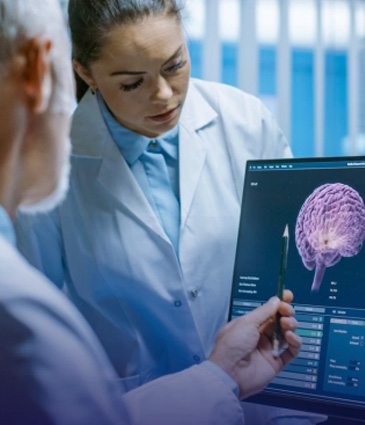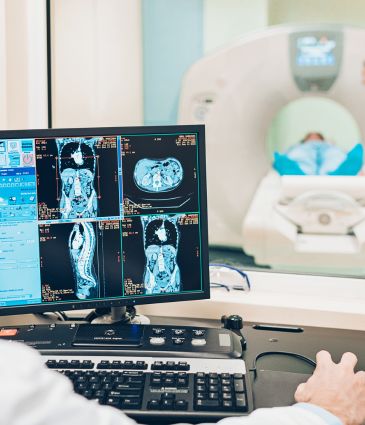
What Does an MRI Check For?
Magnetic resonance imaging is one of the most powerful tools doctors use to look inside the human body. Often called an MRI for short, this technology can give detailed pictures of organs, bones, muscles, and even blood vessels without needing surgery. But what exactly does an MRI check for? Let’s break it down in a way that's easy to understand.
What is Magnetic Resonance Imaging?
A diagnostic procedure known as magnetic resonance imaging, or MRI for short, uses radio waves and strong magnets to produce precise images of your internal organs. Unlike X-rays or CT scans, an MRI does not use radiation, making it a safer option for many people. You lie inside a large machine shaped like a tube during an MRI. It may feel a little noisy, but the scan itself is painless. The machine captures detailed images, which doctors then study to help diagnose or monitor different health conditions.
What Can an MRI Check For?
Magnetic resonance imaging can be used for many parts of the body. Here are the most common reasons doctors recommend an MRI:
Brain and Nervous System
An MRI is often used to check for problems in the brain. It can spot things like tumors, strokes, bleeding, multiple sclerosis, or brain injuries after accidents. If someone is having unexplained headaches, seizures, or memory problems, a brain MRI may be ordered. The scan can also be used to examine the spinal cord, helping to find herniated discs, spinal tumors, or nerve damage.
Heart and Blood Vessels
MRI technology helps doctors look closer at the heart and blood vessels. They can check for blocked arteries, damage from a heart attack, heart defects, and even heart muscle diseases. Cardiac MRI (an MRI focused on the heart) gives detailed information that other tests may miss.
Bones, Joints, and Soft Tissues
If you’ve injured your knee, shoulder, or back, an MRI might be ordered to examine soft tissues like ligaments, tendons, and cartilage. It’s great for spotting torn ligaments, arthritis damage, or subtle fractures that an X-ray might not pick up. MRIs also check for infections or tumors in bones and muscles.
Abdomen and Pelvis
Doctors often use an MRI to check organs in the abdomen and pelvis. It can detect liver disease, kidney issues, pancreatic problems, and tumors. In women, it’s used to find ovarian cysts or uterine fibroids. In men, prostate health concerns can also be evaluated with MRI. This non-invasive test gives much information without the need for surgical procedures.
Special Types of MRI
Not every MRI is the same. Sometimes, a special contrast dye is injected to highlight specific areas better. This is called an MRI with contrast and helps spot inflammation, tumors, or blood flow problems more clearly. Multiparametric Prostate MRI is an advanced MRI that helps detect prostate cancer and guide treatment, especially when PSA levels are high. It’s non-invasive and often avoids unnecessary biopsies. There’s also functional MRI (fMRI), which is mainly used in brain research. It shows how blood flows in the brain, helping doctors understand activity in different brain regions. For the heart, a cardiac MRI offers an in-depth look at heart structures and how well it’s pumping.
Why Would a Doctor Recommend an MRI?
Doctors usually suggest an MRI when they need clear, detailed images that other scans can't provide. You might need an MRI if you have:
- Unexplained headaches or dizziness
- Your arms or legs feeling weak, numb, or tingly
- Chest pain or suspected heart problems
- Severe joint pain or sports injuries
- Swelling or pain in the abdomen
MRIs also monitor chronic conditions, such as tumors, or check healing after surgery.
Benefits of Magnetic Resonance Imaging
MRI is non-invasive and safe, enabling early detection of issues for easier treatment. Its detailed images assist doctors in making accurate diagnoses. Because MRI doesn’t use radiation, it’s a safer choice for people who might need repeated scans, like those with chronic illnesses.
Safety Considerations for MRI
While magnetic resonance imaging is generally very safe, it’s important to tell your doctor if you have any metal in your body, such as pacemakers, implants, or surgical clips. The powerful magnets used in the MRI machine can interfere with these devices. Some people with claustrophobia (fear of enclosed spaces) may feel uncomfortable inside the MRI machine, but clinics can offer options like open MRI scanners or mild sedatives to help.
MRI Costs in Turkey
Turkey is a popular location for reasonably priced, outstanding medical imaging, such as MRI scans. The newest MRI equipment is available at many clinics and hospitals, and appointments may be made quickly. Turkey is a fantastic choice for international patients looking for innovative treatment without long waiting lists because prices are significantly lower there than in other nations.
Conclusion: A Clearer View of Your Health
Magnetic resonance imaging is a safe, powerful way for doctors to see what’s happening inside your body without surgery. Whether it’s checking for a brain tumor, a torn ligament, or heart damage, an MRI provides the information doctors need to diagnose problems accurately and guide your treatment. If your doctor recommends an MRI, it’s a step forward in getting clear answers and taking control of your health.
- Addiction ( 27 )
- Bariatric ( 2 )
- Cardiology ( 10 )
- Check up ( 45 )
- Ear Nose & Throat ( 1 )
- Eye Care ( 2 )
- General Surgery ( 3 )
- Gynecology ( 6 )
- Hematology ( 2 )
- IVF ( 19 )
- Neurosurgery ( 5 )
- Oncology ( 10 )
- Orthopedics ( 8 )
- Physiotherapy ( 1 )
- Plastic & Beauty ( 7 )
- Stem Cells & Longevity ( 19 )
- Transplantation ( 4 )
- Urology ( 7 )







